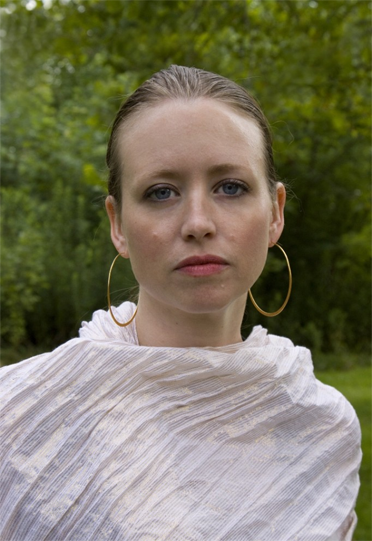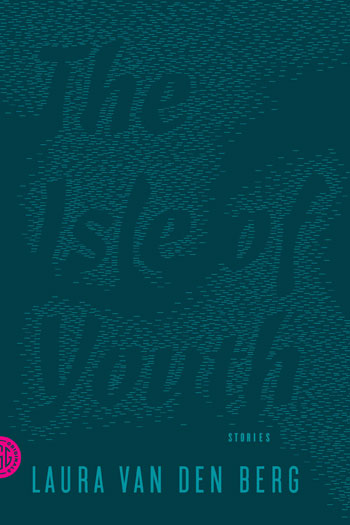
An Interview with Laura Van Den Berg
I first met Laura Van Den Berg in Chicago in 2009 during the annual AWP festival where I was manning the Publishing Genius Press table, desperately trying to sell books among thousands of others trying to desperately sell their books. At that moment, the scene was bleak. But when Laura came to the table she was smart, funny, and curious about each book she picked up. She seemed to care and pay attention to my rambling about the books on the table, and watching her move from table to table, she carried this curiosity with her amongst the thousands of shoulder-shruggers and the downright exhausted. She bought three books, including my own novel, from the table. We’ve stayed in contact ever since.
Laura’s curiosity (I imagine her as someone who could find anything, say, linguine, worth dissecting to find the interesting inside it) carries over into her fiction. Her new collection of stories, The Isle of Youth, mines the lives of men and women in revealing and microscopic ways. Her stories are incredibly sleek, intelligent, and well crafted. After a week of re-reading DeLillo and Lydia Davis, I moved right into The Isle of Youth without once being consciously aware that this is an author who is still in the early stages of her career.
I emailed Laura (who was on the train from Boston to New York where she was giving a reading to promote The Isle of Youth) to discuss gender, death, editing, and to find out how her first novel is going.
—Shane Jones
THE BELIEVER: The summary for The Isle of Youth is only 140 words but I was surprised at how aggressive the sell is that this is a book about women. It “explores the lives of women mired in secrecy and deception,” and, “the reader grows attached to the marginalized young women in these stories.” The stories highlighted in the summary are about “an inscrutable marriage” and a “magician mother.” At the end you’re referred to as a “sorceress.” Do you have any thoughts or reservations about this kind of gender pigeon-holing?
LAURA VAN DEN BERG: I don’t have reservations. All the stories in Isle are narrated by women and are very much about women—in that the male characters, when they appear, tend to be more peripheral, one piece in the puzzle that these women are struggling to assemble. I think I would feel differently if the stories weren’t so women-oriented—like, why would they just focus on this one aspect when I write about other things that have nothing to do with women? But I don’t. So that focus does not feel inaccurate or unfair to me.
My publisher, FSG, actually shied away from overusing the “woman angle” in some ways. An early cover had a woman on it; it was a cool cover but very literal and for sure emphasizing gender more. My editor nixed that one pretty quickly, and we ended up with a much more enigmatic, arguably less conveniently “marketable” cover. Also: it fucking sparkles.
But while we’re on the subject: do you know what’s been driving me crazy lately? People asking why I’m not smiling in my author’s photo, or knocking the photo because I look imposing and unapproachable, as opposed to “warm.” Do people ask you why you’re not smiling in your author’s photo? Or get requests for a different photo because you don’t look friendly enough? I get different versions of this a lot. As a result, I am pretty well determined to never smile in another photo ever again.
BLVR: The story about the cover seems very typical—a designer got the pitch and thought “I’m going with a woman on the cover for this one, done.” I like the cover they decided on. I just didn’t come away from The Isle of Youth thinking “this is a book about women” rather, “this is a book about humans who are all fucked in some sense.” Out in public, or say, on the train right now, do men ever tell you to smile? And no, I’ve never been asked why I’m not smiling or asked to send a different author photo. I’m a thin, white, heterosexual man.
LVDB: It was a cool cover, but we wanted something that would evoke the book in a more comprehensive way. In a funny/nice coincidence, the designer is a friend, so I was unworried because I already knew A. I dug her work and B. if we ran into issues, we could talk it out as needed. Otherwise I might have been a little worried about a palm tree making an appearance, which I really did not want.
And that has happened occasionally: men telling me to smile in public, as though a smile is something that I owe them. But most of the time I’m walking around with my iPod going at full volume, so if anyone is saying anything to me I’m probably missing it.

BLVR: Anytime I see a man telling a woman to smile in public I feel dirty. And the woman always looks attacked, which, in a way, she is, because it’s a way to assume control. This is a fitting segue into what I’d like to discuss next: death. Many early reviews (and again, the Amazon summary) mention “secrets” and “deception.” But I see those things as undercutting to something much bigger and darker going on: a fear of dying. It starts off right away, for example, on page twenty-five when the narrator tells her husband, “I hope we don’t die.” This sentiment seems to run throughout the book. Are you scared to die?
LVDB: Yes. I am suspicious of people who claim not to be afraid of dying. I don’t think they’re telling the truth. I’ve always been most drawn to fiction that wrestles with that death-fear. Sometimes I joke with my students, “If no one is in danger of dying, I’m not interested,” but of course I’m not really joking.
BLVR: I wanted to ask you about editing. I’m drawn to raw stories or books that appear to be a bit loose and wild (I’m thinking, I don’t know, Burroughs or Brautigan maybe) but your stories seem exceptionally well cut and strong. Do you work stories over and over again (Ondaatje, who is a master polisher, described it as sanding a piece of wood over and over again, smoothing out the bumps and imperfections). Do you study sentences, cut and add, move things around, etc. (I’m thinking DeLillo blowing up his sentences on the page and scrutinizing each one).
LVDB: I think part of it is process and part of it is my natural way. I love Brautigan and would love to write with that kind of looseness, but I just don’t. I do revise a lot, though, starting with the macro stuff and then working my way down to the line level and at that stage I do blow up the document (stealing from DeLillo) and read the story aloud and scrutinize all the various parts. But I think my revision process on the one hand is about refining but on the other is also about moving toward mystery, toward the inexplicable. That’s really important to me, to try and not be too neat. For example, in the first story, “I Looked For You, I Called Your Name,” when the narrator was out on the beach I had a lot of other dumb, boring stuff (the narrator sits and thinks!) before I happened upon the sand eating.
SJ: So is the sand eating a conscious decision to move away from “dumb boring stuff” or is strangeness (I’m also thinking of the gang The Gorillas from your story “Lessons”) part of your natural way?
LVDB: Strangeness is part of my natural way for sure. The Gorillas were a part of “Lessons” from the start, as was most of the story element that might be called “weird."
George Saunders:
“The biggest obstacle I’ve encountered (and one I am still encountering) is that I have a tendency to want to coast. That is, to show up in the morning and sort of go on auto-pilot, being very sure of myself and my project, without being willing to really dive in, change course, find some new energy in the story, reject what I think I know about it. That’s an ongoing challenge, I think. And not just in writing.”
I can feel that sometimes in my early drafts, that inclination to coast, so for me part of revision is being able to see where I can do better. In some drafts of "I Looked For You….” I was coasting in the beach scene, writing the predictable moment, the one I had written before, in other stories. I knew I could do better, though it took me a while to understand what “better” might look like.
BLVR: How do you know when you’re done? For me I just reach a point of exhaustion or maybe “sickness” and can’t look at it anymore. I also have to feel some kind of good from it.
LVDB: Who knows, right? I would say fatigue is a marker, this sense that “I have done what I can do.” And that feeling of goodness too, or maybe energy. Like there is *something* going on here. Clearly I am enormously articulate on this subject.
Here’s a question for you: how do you know when you’re finished with a novel? I feel like I could work on mine until the end of time.
BLVR: Hm, I’m not sure. I guess I feel like I just can’t do any more. And if I did do more that I’d somehow hurt the book. Didn’t Frank O’Connor keep editing his stories years after they were published? That seems insane, but I understand it. How is the novel going?
LVDB: Totally insane, but I understand it too. The novel is good now, but the last couple of years were rough. Just a lot of getting stuck, “coasting” in some ways even though I was working really hard, needing to do some hardcore soul-searching about what kind of book I had written vs. what I wanted to write. Then I was at a residency this summer that had (I am not even kidding here) a ghost problem and as a result, I didn’t sleep for days and swam in the ocean a lot and it was like 100 degrees outside. About a week in I had a major breakthrough and tossed most of the book and wrote something like two hundred new pages. Ever since I have been really excited, instead of being full of dread, and the work seems a lot easier now. It should be out sometime in 2015.
BLVR: Do you ever smile while working on it?
LVDB: Once I broke through to the other side with the book, I smiled every time I opened the doc. I smiled (and then started to cry) when a tarot card reader told me that the project I had been struggling with for the last five years was done. I am smiling right now.
Shane Jones lives in Albany, New York.
Photo Credit: Miriam Berkley




